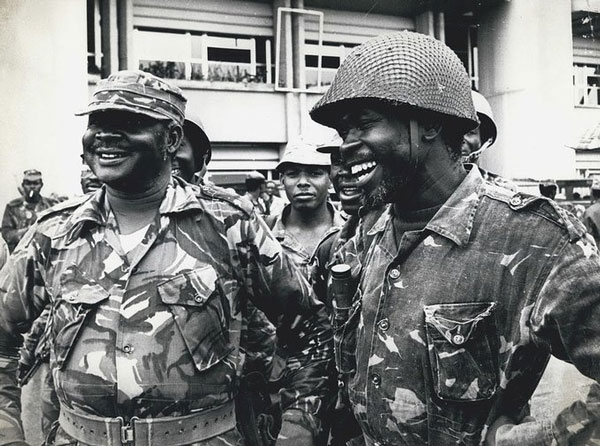
Kampala, Uganda | THE INDEPENDENT | April 11, 2023, marked 44 years since the overthrow of the military government of General Idi Amin Dada.
A combined force of Ugandans living in exile and the Tanzanian People’s Defense Forces (TPDF) stormed Kampala after six months of fighting. The war had started in October 1978 when the Ugandan army crossed into Tanzania and annexed the northern region of Kagera.
After the fall of Kampala, on the afternoon of Wednesday, April 11, 1979, Lieutenant Colonel David Oyite Ojok announced, over Radio Uganda, the fall of what he called a fascist and racist regime of Amin.
IDI AMIN FALLS
On 11 April 1979, only 44 years ago, _Radio_ _Uganda_ broadcast the end of Life President Field Marshall Dr Amin Dada.
2 days later Prof Lule became president.
The rest is only at OwanaPaedia.#Owanapaedia Archives @VickyVaroh pic.twitter.com/6qDHVYbhr1— Tony Geoffrey Owana (@TonyOwana) April 11, 2023
Oyite Ojok had been commander of Kikoosi Maalum, one of the fighting groups under UNLA, during the war to overthrow Amin. He would rise through the ranks rapidly in the subsequent governments to become Chief of Staff and at the rank of Major General by the time he and 10 other officers died in a plane crash in December 1983.
Amin had been in power for eight years since January 1971 when, as Commander of the national army, he orchestrated a military coup against his Commander-in-Chief, President Apollo Milton Obote. Obote would spend a decade in exile in Tanzania from where he would organize with other Ugandans for a comeback.
Amin’s rule would unleash what some scholars have described as a reign of terror, especially targeting the Lango and Acholi whom he believed to supporters of deposed President Obote.
Forty-four years after Amin’s fall, some of the people who witnessed the events share their experiences. Retired Colonel Tony Otoa, a former fighter with Kikosi Maalum and later a serving officer with the Uganda National Liberation Army (UNLA), recalls how they returned to Kampala on April 9th to join Oyite Ojok to declare the fall of Amin’s regime. Otoa, aged 83, says Kampala had technically fallen on Monday but it took them two days to make the now famous announcement because all the radio presenters and technicians had fled.
Patrick Abal, now the head of Arak Ongoda clan, who was then a Senior Three student at St Joseph’s College Ombaci in Arua District, remembers the anxiety, pain and pressure he felt upon receiving the news while in what he calls a foreign land. He says April 11, 1979 happened to be the day students at St Joseph Ombaci were getting First Term holidays. He adds that they boarded a bus belonging to North Nile Bus Company to come home but feeling the pressure that there was a lot of fighting nearing Kampala. He says there was no fighting in Arua initially they travelled home through Koboko, Moyo and Adjumani.
Although Abal made it to Gulu on that same day, it took him an additional seven days to reach his parent’s home in present day Amolatar District due to what he calls the “slow journey.” At home, Abal found a strange welcome.
April 11 passes largely quietly as many political changes in Uganda means other days and events are prioritized. Ishaa Otto Amiza, former Oyam South Member of Parliament argues that the 1979 liberation took a lot of efforts from many gallant sons of Uganda, especially those from Lango and Acholi, who have gone without being remembered. Otto believes that although Government recognizes and celebrates the 26th January Liberation Day, it would be fair to celebrate the other men and women in uniform, and civilians who fought to see that Amin’s tyranny came to an end.
Some political activists are planning to launch the documentation and annual commemoration of those who sacrificed their lives and families to champion the 1979 Liberation. Otto says that nearly every family or clan in Lango lost their dear ones in an inhumane manner at the hands of the State Research Bureau (SRB), the military intelligence agency of Amin’s government.
He says it is unfair to ignore and forget those who paid the ultimate price for the good of Uganda.
Aside from making 11th April a public holiday, Patrick Abal implored the people of Lango not to forget about the past or take threats lightly saying if President Apollo Milton Obote had been vigilant, Amin would not have overthrown him.
The activists are documenting all the liberators and victims of what they call Amin’s dictatorship to help in the annual commemoration of the day.
*****
URN
 The Independent Uganda: You get the Truth we Pay the Price
The Independent Uganda: You get the Truth we Pay the Price



Some communities in Uganda need to contribute to these stories
Other than those whose list can easily be compiled
There are many who kept appearing in silent forms in Namanve, Katuugo forest reserves or rivers
Trying to achieve closure over some one murdered on 5th January 1979 and dumped by an anthill in Katuugo Forest Reserve has left us bruised; even blood relatives choose silence!!